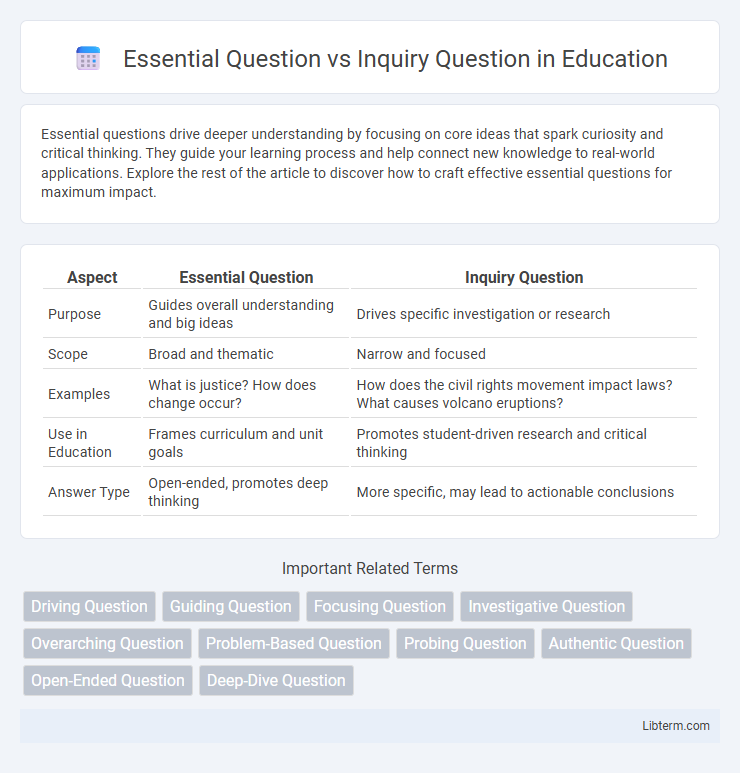Essential questions drive deeper understanding by focusing on core ideas that spark curiosity and critical thinking. They guide your learning process and help connect new knowledge to real-world applications. Explore the rest of the article to discover how to craft effective essential questions for maximum impact.
Table of Comparison
| Aspect | Essential Question | Inquiry Question |
|---|---|---|
| Purpose | Guides overall understanding and big ideas | Drives specific investigation or research |
| Scope | Broad and thematic | Narrow and focused |
| Examples | What is justice? How does change occur? | How does the civil rights movement impact laws? What causes volcano eruptions? |
| Use in Education | Frames curriculum and unit goals | Promotes student-driven research and critical thinking |
| Answer Type | Open-ended, promotes deep thinking | More specific, may lead to actionable conclusions |
Understanding Essential Questions
Essential questions are broad, thought-provoking prompts designed to stimulate deep understanding and ongoing inquiry within a subject area. They encourage critical thinking by addressing core concepts and ideas that promote connections across topics and real-world applications. Unlike inquiry questions, which often seek specific answers or facts, essential questions remain open-ended, fostering exploration and continuous learning.
Defining Inquiry Questions
Defining inquiry questions involves formulating open-ended prompts that guide investigation and critical thinking, emphasizing exploration rather than simple answers. Unlike essential questions, which address broad, fundamental concepts, inquiry questions target specific aspects to deepen understanding through research and analysis. Effective inquiry questions are clear, focused, and encourage students to examine evidence and develop explanations.
Key Differences between Essential and Inquiry Questions
Essential questions are broad, open-ended prompts that guide overarching understanding and encourage critical thinking across disciplines. Inquiry questions are narrower, specific queries designed to drive focused investigation and detailed exploration within a particular topic. The key difference lies in scope: essential questions frame big ideas and connect concepts, while inquiry questions target precise information and support targeted research.
The Purpose of Essential Questions in Learning
Essential Questions guide the learning process by fostering deep understanding and critical thinking about fundamental concepts within a subject. They help students connect ideas, stimulate curiosity, and encourage continuous exploration beyond surface-level facts. This purpose distinguishes Essential Questions from Inquiry Questions, which often target specific information or clarify details.
The Role of Inquiry Questions in the Classroom
Inquiry questions drive student curiosity and critical thinking by prompting exploration and investigation of specific topics within the curriculum. These questions serve as focal points for research and discussion, guiding learners to construct meaning and develop deeper understanding through active engagement. Unlike essential questions that provide broad themes, inquiry questions target particular problems or phenomena, making them vital for fostering analytical skills and inquiry-based learning in the classroom.
Formulating Effective Essential Questions
Effective essential questions are open-ended, thought-provoking, and designed to stimulate deeper understanding and critical thinking about core concepts. They focus on broad themes that connect multiple topics and encourage exploration, unlike inquiry questions, which are more specific and targeted toward particular pieces of information. Crafting these questions involves ensuring clarity, relevance to the curriculum, and the ability to promote ongoing inquiry and discussion across different contexts.
Strategies for Crafting Inquiry Questions
Effective inquiry questions are open-ended, engaging students in exploration by focusing on specific content areas and promoting critical thinking. Strategies for crafting inquiry questions include aligning them with learning objectives, ensuring they stimulate curiosity, and allowing multiple perspectives or answers to foster deeper understanding. Essential questions tend to be broader and thematic, while inquiry questions target precise, researchable issues that guide the investigation process.
Examples of Essential vs Inquiry Questions
Essential questions probe deep, overarching themes like "What does it mean to be free?" while inquiry questions explore specific aspects, such as "How did the abolition of slavery affect American society in the 19th century?" An example of an essential question is "Why do societies need laws?" contrasted with an inquiry question like "What laws were established during the Roman Republic to manage social order?" Essential questions guide broad understanding and reflection, whereas inquiry questions target detailed investigation and evidence-based responses.
Benefits of Using Both Question Types in Education
Essential Questions promote deep understanding by encouraging students to explore overarching concepts and big ideas across subjects, fostering critical thinking and long-term retention. Inquiry Questions stimulate curiosity and active learning by guiding students to investigate specific topics or problems, enhancing research skills and personalized knowledge construction. Combining both question types creates a dynamic learning environment that balances conceptual depth with focused exploration, improving student engagement and mastery.
Best Practices for Integrating Essential and Inquiry Questions
Integrating Essential Questions with Inquiry Questions enhances student engagement by connecting broad, thematic ideas to specific, investigative tasks. Best practices include aligning inquiry questions to multiple essential questions to deepen understanding and promoting iterative questioning that refines student inquiry based on emerging insights. Effective integration also involves scaffolding inquiry processes to support critical thinking while maintaining focus on the enduring concepts represented by essential questions.
Essential Question Infographic

 libterm.com
libterm.com